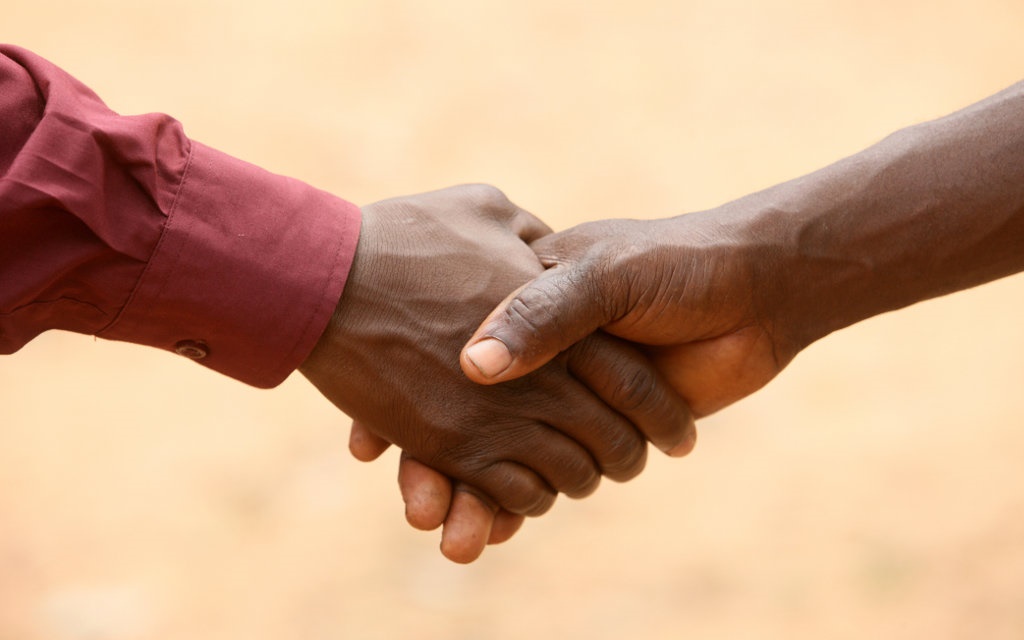
- Covid-19 and the social distancing rules introduced to prevent transmission of the virus have forced a change in how we greet each other.
- African societies have a number of non-verbal, contact-free gestures that have worked as greetings for centuries.
- Analysts say humans can change fundamental societal behaviours if the reasons are compelling.
When international and local businesspeople gathered to attend summits at the start of the year in South Africa, few worried that shaking hands could make you sick.
Shaking hands was still seen as the commonly accepted way of introducing oneself. Business cards were traded little restriction.
Now, months later, few South Africans can even spend extended hours outdoors, let alone make physical contact with loved ones and colleagues.
As a result of the spread of the coronavirus pandemic, the world has had to get used to social distancing, which includes physical isolation and avoidance of unnecessary physical contact.
In late March, some South Africans chuckled when President Cyril Ramaphosa recommended people bump elbows instead of handshakes, complete with a physical demonstration. But, more than a hundred days into the national lockdown, handshakes have disappeared.
And while handshakes have been noted in human life as far back as the ancient Latin artworks of Dexiosis, similar physical gestures and forms of touch are a common means of communication among apes.
There are no shortages of theories about where the handshake came from and how they became the commonly accepted form of non-verbal greeting in much the world.
What is clear now is that survival charges humans to find another safer way of interacting with each other, at least for now.
African societies have a number of non-verbal, contact-free gestures that have worked as greetings for centuries. Zulu speakers commonly raise both hands with their palms open to eye level as a greeting or acknowledgement of someone's presence. Other gestures common in southern Africa including the clapping of hands and a subtle nod.
Shaky beginnings
Political analyst and former chief operating officer of the National Heritage Council, Somadoda Fikeni, said age-old African gestures of greeting can be evoked as an appropriate response to this new problem.
"Throughout cultures and traditions have evolved and have been responsive to changes in circumstances. This goes against the myth that they are rigid. For, instance, during Mfecane war, circumcisions were halted," said Fikeni.
Director of the Institute for Humanities in Africa at the University of Cape Town, Divine Fuh, said "to attempt to historiocise handshakes is to lie" because it means relying on "legitimated" archival knowledge and recorded history.
"That history tells us that handshakes can be traced as far back as ancient Greece, which is of course problematic, and a lie. Because that history is only as relevant as a particular praxis of documenting that as we already know cannot code other ontologies," said Fuh.
Fuh said, because much of these social cues are about etiquette as well as connection, the elbow bump made a lot of sense as an alternative way to connect with people, fulfilling the obligations of greetings and intimacy.
"The virus is transmitted through our most intimate encounters and gestures of conviviality. Bumping the elbow allows us to continue the custom of warmth and building trust. Gestures are part of our customs and everyday practice and will remain so," said Fuh.
Anthropologist at the University of KwaZulu Natal, Dr Balungile Zondi, noted that the shaking of hands in most cultures symbolised acceptance, recognition and respect. Zondi said this creates a sense of comfort among people meeting for the first time or who haven't seen each other for a while.
"Historically, from the time of hunters and gatherers we (as humans) lived in groups. Social distancing was not part of their social life of daily activities. We would hunt and eat food together, not worried about hygiene. Cleanliness was never an issue. We come from a history where food and water were scarce," said Zondi.
Out of Africa
Fikeni said it was to be expected that African forms of greeting would not be suggested by government immediately to replace the handshake, because there was an "in-built skepticism towards African solutions" and a tendency to judge all solutions and ideas against Euro-centric standards.
Fuh said, in some societies, handshakes also distinguish commoners from nobles, royalty and clan heads whose hands and bodies are sacred and therefore taboo to touch.
"Probably because handshakes are the tools through which we establish friendship and intimacy with others, especially strangers, Covid-19 has focused on this. But what is regulated is touch, which is essential to how we live and connect to others," said Fuh.
Change for good?
Zondi said it was possible for modern society to adapt to changes as fundamental as greetings, but for such changes to take hold in the long term "it must be done repeatedly".
"We need responsible people, initiators who will act accordingly. We must make sure we socialise people in that space of a new way of greeting," Zondi said.
Fikeni said changes to human behaviour will succeed or fail based on the strength of the reasons behind them. If the reasons are as fundamental as health and survival, changes can become permanent in a matter of a year.
"It can't be done in a short period of time. But at the same time, it would not take generations if it is motivated by a shock such as a pandemic. But if it is done just for the sake of changing, it will take very long," said Fikeni.
Fuh noted how facemasks have become the screen through which we experience the world and are now so central to our being that children remind us to wear masks when leaving home.




 Publications
Publications
 Partners
Partners











